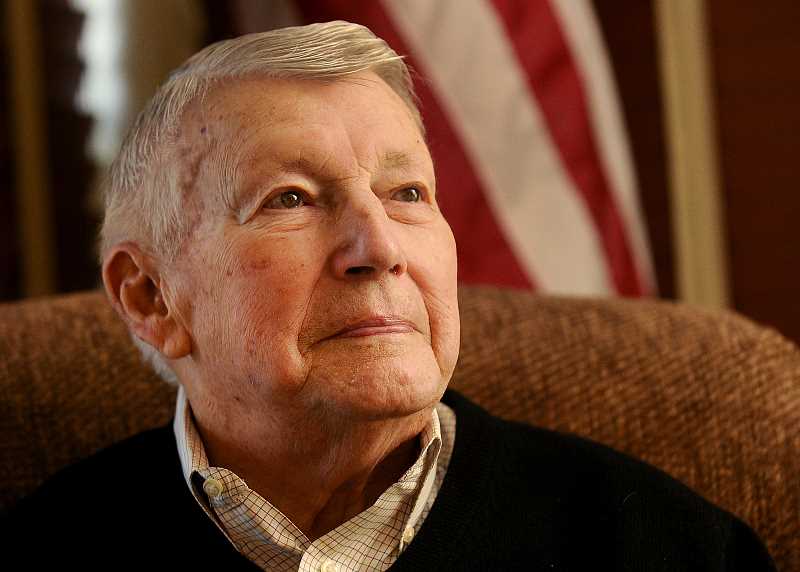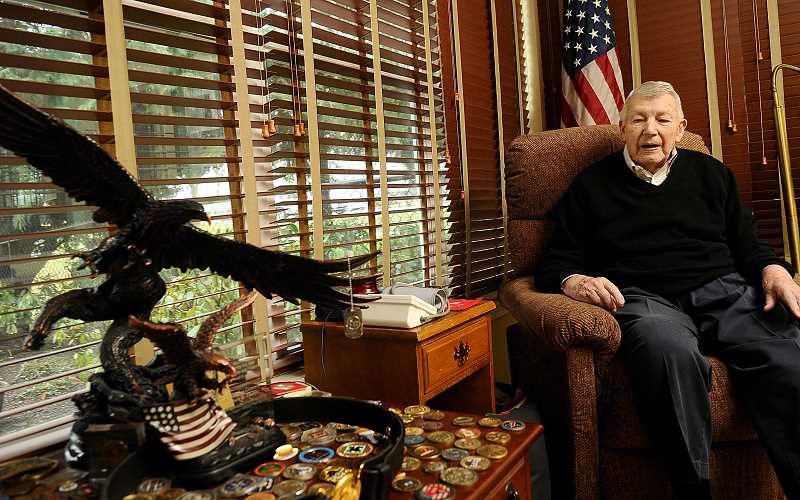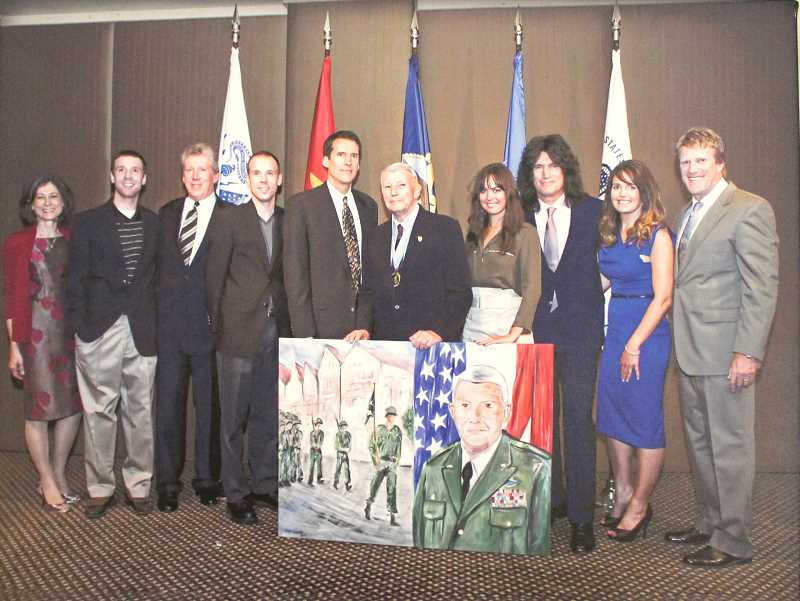
There's no doubt that Brig. Gen. James B. Thayer is a hero, but that's a label the 96-year-old Lake Oswego resident would never use for himself.
As Thayer sees it, he was just in the right place at the right time. But for the 15,000 Hungarian Jews whose lives he and his platoon saved while searching for Nazi ammunition dumps near Wels, Austria, it was divine fate.
For 50 years, Thayer spoke of the experience with almost no one — until he was invited to 50th anniversary of the Holocaust in Vienna by the U.S. Holocaust Council in 1995.
"I said that under no circumstances could I go back. But the Secretary of Defense's office called me and said I had to go," he recalls. Soon enough, he was touching down in Vienna and on his way to a ceremony that would pay homage to the millions of Jews who weren't liberated and died at the hands of the Nazi death machine.
While in the airport, a man came up to Thayer and began explaining who he was.
"He said, 'My name is Wolf, and I want you to know I wouldn't be standing here if you hadn't found us when you did. I was 14 years old, and I wouldn't have lasted another 24 hours,'" Thayer says. "That totally changed my viewpoint on the killing I'd been involved with. By that time, I started telling my story."
Born to serve
Thayer was born March 10, 1922, in Portland. He grew up and attended school in the small Yamhill county town of Carlton, where he was one of about 100 students.
From a young age, Thayer was enamored of journalism and remains so to this day. He was the editor of his high school's newspaper and went on to work as advertising manager of the Daily Emerald while studying economics at the University of Oregon.
When the Japanese attacked Pearl Harbor, Thayer was a sophomore at UO and had recently joined what we know today as the Reserve Officers Training Corps.
"All my friends were joining the Marines and Naval Air Force. I wanted to join, but I didn't want to get drafted. So i went in as a buck private (in the U.S. Army) and went to officer candidate school," Thayer says.
He quickly rose through the ranks and, by 1944, found himself clearing mines in Normandy and leading a team of 16 American soldiers as a second lieutenant.
"It was a dangerous job," he says. "I always felt like I was given the bum jobs, but I ended up establishing a mine platoon training center and received high marks for my efforts, even though I wasn't overly enthusiastic about the job."
As the Germans began to retreat east across France and back into Germany, Thayer's role changed: His platoon was selected for reconnaissance missions.
"My commanding officer brought me in and said, 'Jim, I've got a job for you, and I know you can do it,'" he says. "Basically, they wanted us to go out ahead until we started getting shot at, and then report back where (the Germans) were shooting from."
On Sundays, Thayer would take his men to church, stash their weapons on the balcony and attend service. He says he's always had a close connection to God, and he credits his faith for his successes not only in the military, but also in his personal and professional career as a businessman.
He remembers one particularly moving service on Easter Sunday after having crossed the Rhine River into German territory.
"Everything I've accomplished, basically, God has done it for me," Thayer says. "I never felt I was overly capable."
Toward the latter part of the war, Hitler planned to evacuate Berlin and head for a remote perch high in the Alps. In advance of his escape, he sent SS troops to clear a path for his evacuation. Thayer's battalion was assigned to enter Austria from the west to block the route, and once again, his platoon was set out on reconnaissance.
"We ran into the SS about 40 miles outside of Vienna. We were tired, but we ran into their advance guard and my soldiers immediately reacted and we killed 31," Thayer recalls, and so he made a calculated decision: If his 16 men were able to take out 31 of Hitler's best troops, it was probably safe to continue forward into a small village that lie ahead.
But as they entered the village, Thayer's platoon realized they'd just walked into the headquarters of an SS regiment that was 800 strong — and an SS commander who was ready to sacrifice himself rather than surrender.
"Their battalion commander told me he wasn't allowed to surrender unless he killed me and killed himself too," Thayer says. "It was tough. I thought I was going to die."

With the help of a sergeant who spoke German, Thayer tried to negotiate with the SS commander. But he soon realized that the man had a live grenade attached to a lanyard around his neck and intended to sacrifice himself to kill Thayer and the rest of his troops.
"He was in a rage. He said he had a lot of men and he was going to kill all 16 of us. I told him, 'Well, we're going to burn your town down,'" Thayer says.
Fortunately, Thayer was able to keep the commander talking long enough for his battalion to advance from the rear and defuse the situation — and Thayer was credited with the capture of 800 SS troops.
"That's the type of thing where I got the opportunity to save lives. That was a good part of the story," he says. But the next part of the story was a gruesome experience that scarred his psyche for more than 50 years.
Divine fate
Thayer's next assignment was to search for an ammunition dump rumored to be part of Hitler's escape plan. He led his platoon out into the brush, and began searching. It wasn't an easy task, because the map they were using wasn't complete, and the roads were barely roads at all.
"Everytime I talk to anyone about this, it's hard for me," Thayer says. "We went into this forest and we found somewhere between 3,000 and 4,000 people laying on the ground, dying. Not from gas chambers or anything, but from malnutrition. It was pretty serious. They were begging for help, but we didn't know what to do.
"We had no idea there were 15,000 more Hungarian Jews there as well," he says. "They were grabbing at our boots, so we gave them what rations we had, and some of them couldn't eat. They choked on the food and died on the spot. There was nothing we could do."
Thayer radioed back to his battalion and asked them to send as much help as they could. As it turned out, the 15,000 Hungarian Jews that Thayer and his men stumbled upon were a group that had been chased out of Budapest by advancing Russian troops; in their escape, they ran directly into the arms of the Nazis and sent to a work camp called Gunskirchen Lager, where they were expected to die.
"It was hell on Earth. People were dying and bodies piled up three, four high," Thayer says.
Following his military service, Thayer returned to Oregon and completed his education at the University of Oregon. He continued his service in the Army Reserves, commanding a unit out of Vancouver, Wash. In 1954, he married the love his life, Patricia Cunningham, and settled in Beaverton, where he started his business, J. Thayer Company, one of the largest office supply firms on the West Coast.
Thayer continued to serve in a number of leadership roles, including president of the Port of Portland, president of the Beaverton Chamber of Commerce and president of the Oregon Historical Society.

He retired from the Army in 1982 as a brigadier general, but he continues to serve his country to this day as a civilian aide to the Secretary of the Army. He was honored recently when the Oregon Military Museum at Camp Withycombe was named for him.
"I wasn't a hero," Thayer insists. "I just happened to be in the right place at the right time. That's just a quick overview of the opportunities that God has given to me."
Contact Lake Oswego Review reporter Sam Stites at 503-636-1281 or sstites@pamplinmedia.com.